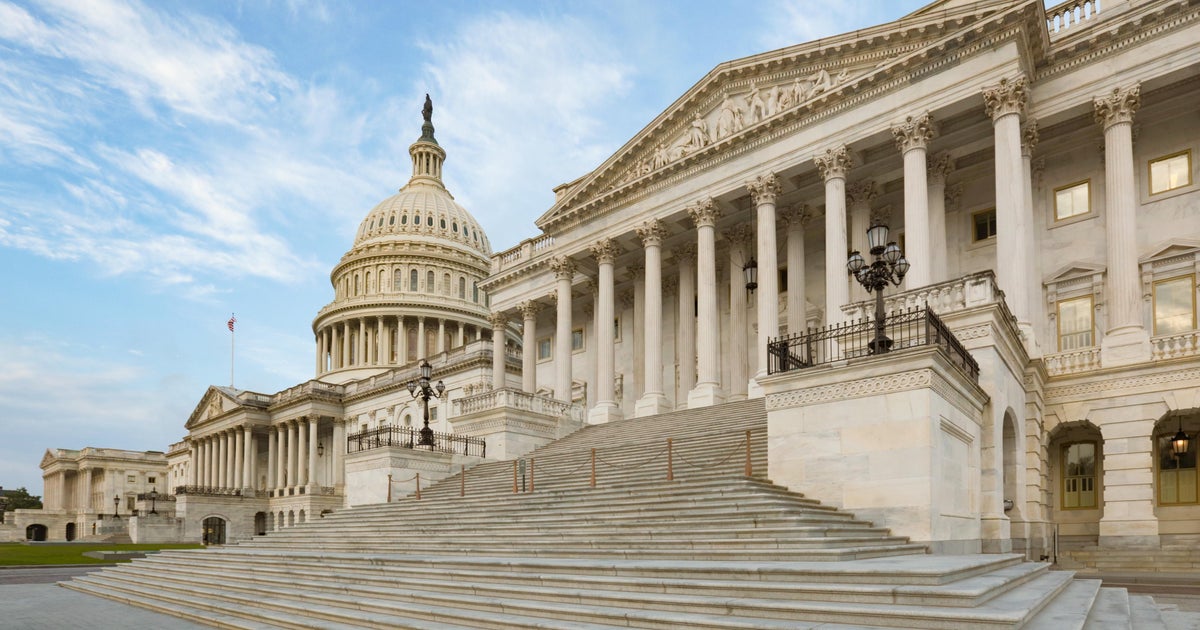CBS News
Donald Trump wins North Dakota caucuses, CBS News projects

Former President Donald Trump has won the North Dakota Republican presidential caucuses, CBS News projects.
The win comes one day after former U.S. Ambassador to the U.N. Nikki Haley secured her first victory of the 2024 presidential nomination contests, winning the Washington, D.C., Republican presidential primary.
The White House hopefuls now turn their attention to Super Tuesday, when results will pour in from 16 states in contests that amount to the single biggest delegate haul of any day in the presidential primary. Trump and President Biden, a Democrat, are dominating their races and are on track to winning their party nominations later this month.
Trump’s commanding victory in North Dakota grants him all of the state’s 29 delegates under the state’s rules.
There are 865 Republican delegates up for grabs on Tuesday. A GOP presidential nominee needs 1,215 delegates to secure the party’s nomination. Victory in North Dakota’s caucuses puts Trump at 276 delegates to Haley’s 43.
Alon Skuy / Getty Images
Four candidates were on the ballot, including Trump and Haley. The other candidates, who have received little attention, were Florida businessman David Stuckenberg and Texas businessman and pastor Ryan Binkley, who recently ended his campaign.
Retired music teacher and librarian Karen Groninger, of Almont, said Monday that she voted for Trump, calling him the best choice. The 76-year-old cited Trump’s 2020 speech at the annual March for Life anti-abortion event in Washington, D.C. —the first by a sitting president— and his border policies.
Longtime Republican state Sen. Dick Dever, of Bismarck, said he voted for Haley, but added she’s unlikely to win. The retired factory representative, 72, said, “I hear an awful lot of people say that they really liked Trump’s policies but they don’t like the way he conducts himself, and I think he’s gone overboard a bit.”
Caucus voters were encouraged to be paying party members, but those who wouldn’t pay $50 for annual membership were asked to sign a pledge to affiliate with the party, caucus Chair Robert Harms said.
North Dakota is the only state without voter registration. The caucuses followed official state voter identification protocols, such as providing a driver’s license. Voting was done only in person and on printed ballots, which will be hand-counted.
In 2016, it was a North Dakota delegate who helped Trump secure the number needed for the Republican presidential nomination. He swept North Dakota’s three electoral college votes in 2016 and 2020, winning about 63% and 65% of those votes, respectively.
As president, Trump visited Bismarck and Mandan in 2017 to talk about tax cuts, and he campaigned twice in Fargo in 2018 for Kevin Cramer in the then-congressman’s successful Senate bid against Democratic Sen. Heidi Heitkamp.
North Dakota’s Democratic-NPL Party is holding a presidential primary almost entirely by mail, with mail-in voting from Feb. 20 to March 30, and limited in-person voting for residents of Indian reservations. President Biden, Rep. Dean Phillips and six others are on the ballot.
A third party will count ballots in Fargo on March 30, with results available on the party’s website afterward.
Sen. Bernie Sanders won the Democratic caucuses in the state in 2016 and 2020.
CBS News
Social Security Fairness Act clears key Senate hurdle, heads to final vote

Legislation to expand Social Security benefits to millions of Americans cleared a key hurdle in the U.S. Senate on Wednesday afternoon and is now headed toward a final vote.
Senators voted 73-27 to approve a motion to proceed with consideration of the Social Security Fairness Act, according to an unofficial Senate tally shown in a webcast on the floor of the chamber.
“We will vote on taking up the Social Security Fairness Act to repeal flawed policies that eat away at the benefits of those who’ve worked as teachers, firefighters, postal workers, or public sector workers,” Senate Majority Leader Chuck Schumer said on social media shortly before the procedural vote. “Retirees deprived of their hard-earned benefits will be watching closely.”
The New York Democrat has pushed to bring the measure up for a full vote, which would eliminate two federal policies that prevent million of Americans, including police officers, firefighters, postal workers, teachers and others with a public pension from collecting their full Social Security benefits.
“Social Security is a bedrock of our middle class. You pay into it for 40 quarters, you earned it, it should be there when you retire,” Ohio Senator Sherrod Brown, a Democrat who lost his seat in the November election, told the chamber ahead of Wednesday’s vote. “All these workers are asking for is for what they earned.”
Sen. Thom Tillis spoke against measure, saying that while a small percentage of people are not getting what they should from Social Security, enacting what he framed as an unfunded government mandate that would increase the federal deficit “is not the way to fix it.”
“This bill will take $200 billion during the 10-year period out of the Social Security trust fund without any way to pay for it,” the North Carolina Republican added.
What is the Social Security Fairness Act?
Decades in the making, the Social Security Fairness Act would repeal two federal policies — the Windfall Elimination Provision (WEP) and the Government Pension Offset (GPO) — that broadly reduce payments to nearly 3 million retirees.
That includes those who also collect pensions from state and federal jobs that aren’t covered by Social Security, including teachers, police officers and U.S. postal workers. The bill would also end a second provision that reduces Social Security benefits for those workers’ surviving spouses and family members. The WEP impacts about 2 million Social Security beneficiaries and the GPO nearly 800,000 retirees.
“This stuff takes time, but 21 years is ridiculous,” said Brown of the process. The Senate held its first hearings into the policies in 2003.
The measure, which passed the House in November, had 62 cosponsors when it was introduced in the Senate last year. Yet the bill’s bipartisan support eroded some in recent days, with some Republican lawmakers voicing doubts due to its cost. According to the Congressional Budget Office, the proposed legislation would add a projected $195 billion to federal deficits over a decade.
At least one GOP senator who signed onto similar legislation last year, Sen. Mike Braun of Indiana, said he was still “weighing” whether to vote for the bill. “Nothing ever gets paid for, so it’s further indebtedness, I don’t know,” Braun said last week, the Associated Press reported.
“In the end it’s going to come down to individual members are going to make their own decisions about where they want to come down on that,” incoming Republican leader John Thune said at a press conference Tuesday. “Obviously I am concerned about the long-term solvency of Social Security and that is an issue I think we need to address.”
Without Senate approval, the bill’s fate would end with the current session of Congress, and would need to be re-introduced in the next Congress.
CBS News
Behind the House Ethics decision to release the Matt Gaetz misconduct report

Watch CBS News
Be the first to know
Get browser notifications for breaking news, live events, and exclusive reporting.
CBS News
Seeking a motive in the Madison school shooting case

Watch CBS News
Be the first to know
Get browser notifications for breaking news, live events, and exclusive reporting.


